MUSE the

CREATIVITY
Igniting passion, imagination and innovation







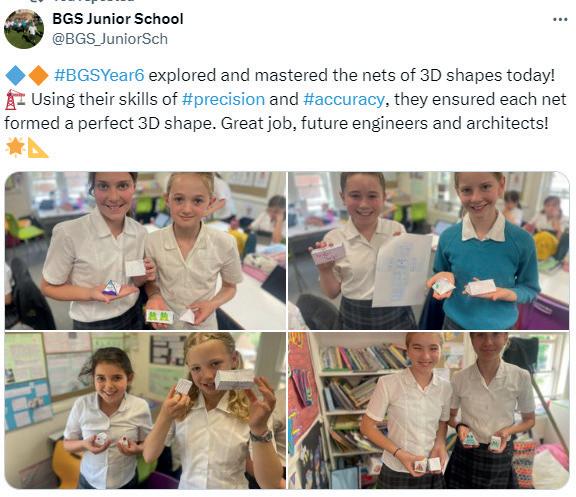















Igniting passion, imagination and innovation





















Like many of you, I have found myself glued to the coverage of the Olympics this summer, developing a sudden fascination and knowledge for sports that I previously knew nothing about! Watching incredible athletes perform at the absolute best of their abilities, witnessing the determination on their faces and hearing the stories of how they have reached this elite level of expertise is totally inspiring. It reminds us, at a time when the world is often full of stories of negativity and volatility, that passion, commitment, teamwork and dedication will win out. As an educator this is at the core of what we aspire to teach all the young people in our care.
My ambition at BGS is that every student leaves us knowing themselves, understanding where their passions lie; having the skills to commit to a project, a friendship, a sports team or an artistic performance; and most importantly recognising that dedication and hard work will always be rewarded. Our role as teachers is to nurture and encourage their skills, their knowledge and their self-belief.
As we reach the end of another school year, I can see where these attributes have had an impact on every individual in our community. Our Sixth Form students are leaving us to move on to study at university, or to join the working world, with the academic skills and confidence to tackle the opportunities of the next stage of their lives. Many of our students demonstrated hours of dedication as they performed beautifully in summer concerts or showcased stunning artwork to proud family and friends. Others have skilfully represented the school at a plethora of sports or navigated changes in friendships to grow through personal development.
I hope that as you read the pages of this edition of the Muse you can see how a wealth of talent and passion is being nurtured at BGS; whether that is through the Music Maestros collaboration, our annual art and textiles showcase or our Year 6 Film in a Day workshop. I know that you will also find it interesting to see the broad range of our co-curricular on offer on pages 7 and 8. It is only when you see it laid out graphically that you get a sense of the scale of what is on offer, as we help every student find that spark of interest which will develop into a lifelong passion.
I am a great believer in the power of role models and mentoring; seeing yourself and your dreams being reflected through the life of someone around you is incredibly powerful, fuelling aspiration, whether that be in the creative arts, in academia or on the sports fields. We are extremely fortunate that through our alumnae and community we have a strong network of supporters and we were thrilled to invite so many leading representatives from the world of sports into school last term for National School Sports Week. These outstanding professionals threw a light on the many paths that a career in sports can take and offered bespoke masterclasses to some of our younger talented sportswomen; I am sure you will enjoy reading all about the week on pages 13 and 14. As I once again reflect on the pathway to sporting success, as personified by the incredible Olympians (including our very own 2013 alumna and 1500 metre runner, Revée WalcottNolan) I can see how many of our students are inspired by the role models they meet.
Finally, growing up is never linear, education is never a straightforward path to success, but with each small step in an incredibly supportive environment every student can soar. We are constantly looking at new effective pastoral tools which can further enhance the care for our students, providing them with strategies for responsibility and self-regulation as they navigate friendships and growing up in the 21st Century. Mr Matt Gracie, Deputy Head - Student Engagement and Welfare, explains why we have adopted the Girls on Board programme and how it will benefit all our students.
After a well-earned summer rest, I look forward to another term of growth, success and creativity at BGS.
Best wishes
Gemma Gibson Headmistress
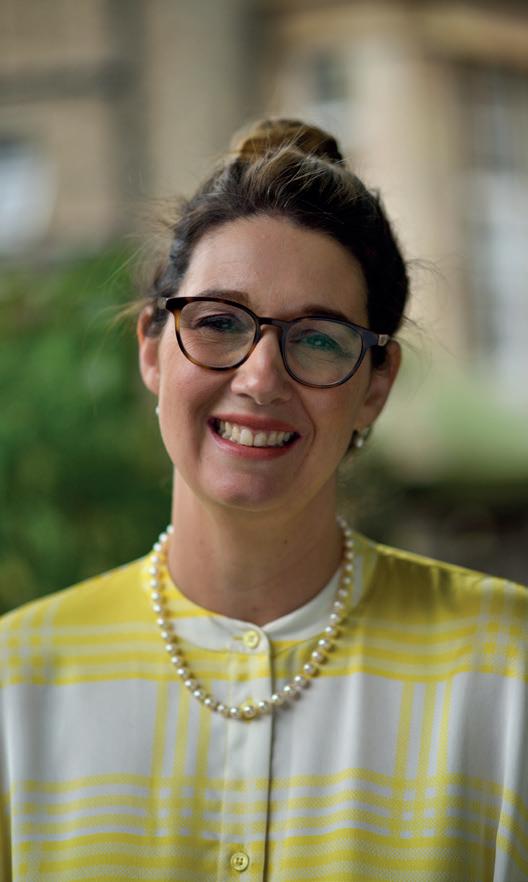
We help them build not only intellectual confidence but self-belief, resilience and wider understanding of the world.
“Happiness and well-being come from accepting ourselves fully, embracing our flaws and celebrating our strengths.” Fearne Cotton, television and radio presenter, author and podcaster.
Our well-being programme is at the very heart of our Sixth Form. We want to ensure that all of our students have a healthy balance between their academic studies and self-care. Part of this programme is giving them opportunities to unwind both inside and outside of school, and this year we introduced our inaugural Well-being Festival for our Lower Sixth students.
The festival was carefully planned by our dedicated Sixth Form Pastoral Officer, Mrs Sara Lonsdale, who found a tranquil location where the students could relax and have fun in the fresh air. The Muse sat down with Mrs Lonsdale to chat about how she planned such a fantastic and relaxing trip.
“Eighteen months ago, I was asked to create some ideas for a Lower Sixth residential trip. The brief was: Lower Sixth, an overnight stay, fun! My initial excitement was quickly quashed with panic - where do you take a large group of Sixth Form students that is fun and safe, free of life’s temptations? I began with a Pinterest style mood board and very quickly a plan formulated. Inspiration was taken from Fearne Cotton’s Happy Place podcast and the annual festival that Fearne hosts.
“Student well-being was the foundation of the trip, a vision of festival vibes began to overspill; disco balls with tree bunting, glitter, yoga and sound bath, pop-up street food style food trucks, glamping barn blanketed with fairy lights, inflatable unicorn sticks for a race around the grounds, no WI-FI, moments for reflection, mindfulness crafting and making memories with friends.
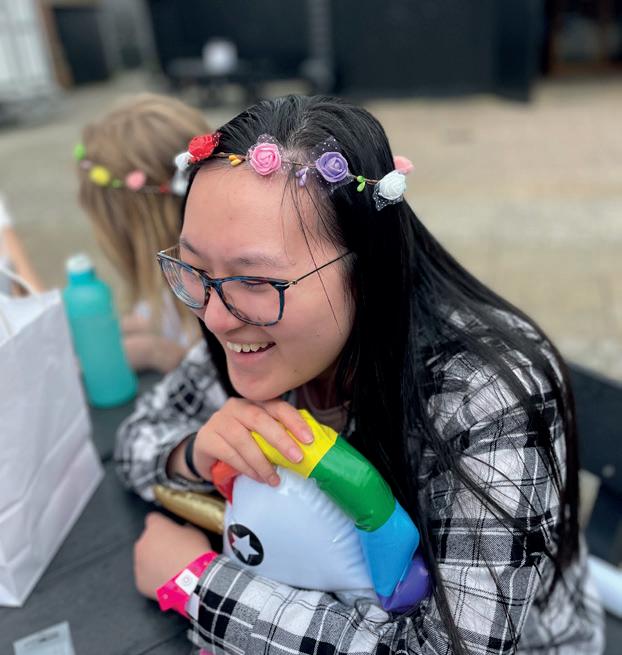
“Set in stunning countryside surroundings, Layer Marney Tower was the perfect sanctuary for 24 hours, a magical retreat for the students to unwind, after Lower Sixth exams. Giving them space to relax and recoup as they start to look towards post-school options. Sixth Form is a busy, intensive period of time; helping students to learn that it is important to step away and find time to relax is key to helping them navigate life after school.”
The group had the whole of Layer Marney Tower’s estate, in Colchester. During the day they took part in a variety of activities including garden games, designing t-shirts, unicorn racing, and glitter face painting. Anyone who wanted some quiet time could spend some time in the barn, find a peaceful corner to read a book or wander over to the farm area where they were greeted by goats, pigs and chickens.
There was a yoga session and sound bath experience, allowing the students to be in a truly calming environment, giving them meditation and relaxation mechanisms that they could take away with them to use as part of their daily routines.
In the evening, after some tasty pizzas and desserts, two of the students led a sunset line dancing session. Then, as night fell, a silent disco – DJ’d by our Senior Tutor, Mr Gibson – lit up the tower. The disco was a huge hit with both staff and students singing and dancing the night away!
Mrs Londsdale added: “To conclude the minibreak, we slotted in some retail therapy and explored the alluring city of Cambridge en route home to BGS, a perfect finale to a reflective respite. I wanted students to reconnect with each other and themselves, to be away from devices and have good oldfashioned fun together. We definitely achieved that aim.”
Lower Sixth student, Lottie Maitland agreed: “It was so much fun it really helped relax everyone and we all hung out together. Plus, the atmosphere was fun as there is a certain amount of flexibility in the programme so there were times when you could just sit and chat with your friends.”
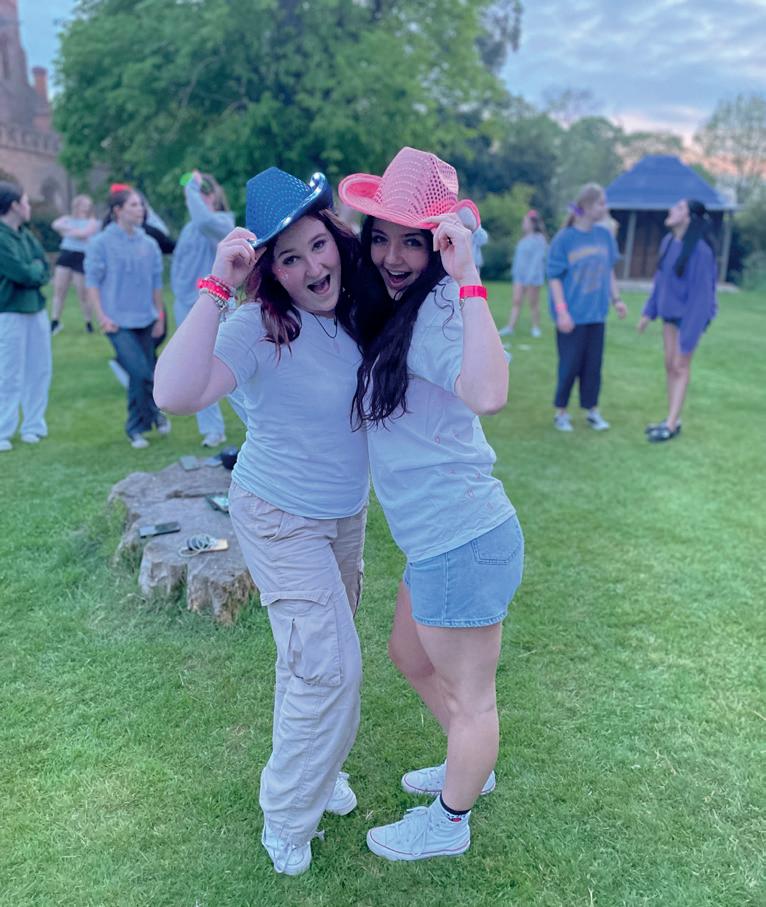
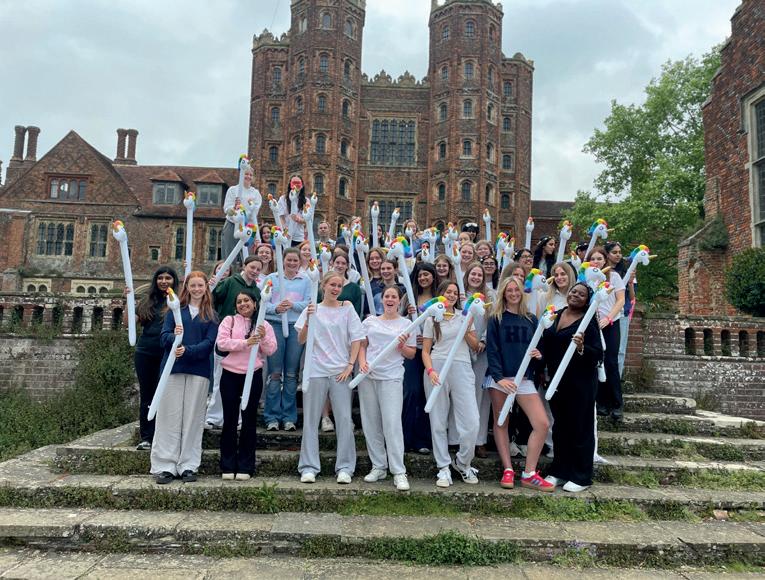
Lauren Blower, commented: “It was very relaxed; you could get involved with everything or you could just sit and read a book. It was enjoyable and just felt like a fun weekend with your friends.”
Rachel Forbes-Laird added: “It was a great opportunity to relax with your friends and bond with those you haven’t interacted with as much before. It was a really lovely break following our exams. The flexibility in activities really added to the positive well-being effect.”
Mrs Lonsdale has already begun to work with the student Well-being Committee to start planning for next year’s event back at Layer Marney Tower as another BGS tradition starts to take shape.

The Bedford Music Hub, in association with the renowned Philharmonia Orchestra, proudly presented The Young Composers Project, an inspiring initiative that spanned from September 2023 to March 2024. Spearheaded by Tamsin Lodder from Bedford Music Hub and Adam Grady, Education Manager from the Philharmonia Orchestra, the programme provided a platform for over 100 GCSE and A Level students across Bedford to develop their musical talents. BGS Music teacher, Mrs Naomi Jones played a vital role in helping facilitate this ambitious project, ensuring its smooth operation and offering her expertise to the participating students.
Mrs Jones reflected on the beginnings of the project, she said: “The project commenced with a memorable event at BGS in September 2023. Students from various schools gathered to enjoy a short concert performed by members of the Philharmonia Orchestra. This initial exposure to live professional music set the stage for the learning experiences that followed. The concert not only entertained but also provided a real-life reference for the students, enhancing their understanding of instrumental dynamics and musical expression.
“Following the concert, students participated in a series of workshops designed to deepen their musical knowledge and compositional skills. These sessions were meticulously crafted to cover instrumental techniques, with Philharmonia Orchestra musicians demonstrating specific techniques for various instruments and offering insights into the intricacies of performance and sound production. This hands-on learning was invaluable for students, giving them a practical understanding of how different instruments contribute to a composition.”
Mrs Jones continued: “Additionally, students were guided through the fundamentals of music composition, exploring various styles and techniques. They learned about structuring their pieces, developing motifs, and the creative process of transforming ideas into musical works. This phase encouraged them to incorporate the techniques they had learned and heard into their own compositions. The presence of live music allowed teaching staff to reference real performances when instructing students; elevating the standards of both teaching and learning as well as fostering a rich educational environment that emphasised creativity and high-quality composition.”
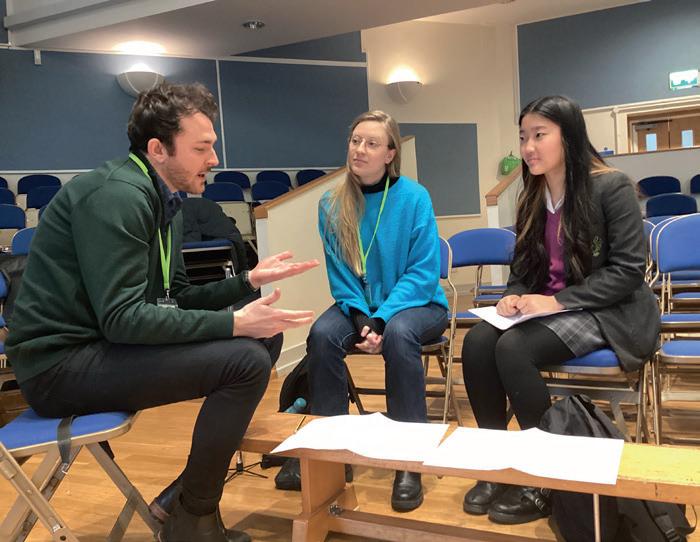
In late January, selected students from Sharnbrook Academy, Mark Rutherford School, Bedford Modern School, Biddenham International School and Sports College, Goldington Academy and BGS returned for advanced workshops. These students, whose compositions had been recognised by their respective schools, had the unique opportunity to work closely with Philharmonia musicians and the orchestra’s composer-in-residence. Mrs Jones expanded on this: “This session provided one-on-one mentoring, focusing on refining their compositions with specific instrumental techniques. The students also had the extraordinary experience of hearing their works performed in progress, allowing for immediate feedback and further refinement.”
The culmination of The Young Composers Project took place on Monday 13th May with a final performance evening. This celebration showcased the remarkable work completed by the students, who had grown significantly as composers and musicians over the course of the project. Each student had the opportunity to hear their piece performed by some of London’s finest musicians, sharing their achievements with friends, family, teaching staff, and peers. The final performance highlighted a diverse array of musical styles, reflecting the broad range of influences and techniques the students had absorbed. The event was not only a testament to their hard work and creativity but also a celebration of the musical journey they had embarked upon.
Mrs Jones concluded: “The Young Composers Project was a resounding success, providing an exceptional platform for young composers to develop their talents. It was a delight to host this fantastic initiative, and a huge thank you to Tamsin Lodder from Bedford Music Hub and Adam Grady, Education Manager from the Philharmonia Orchestra, for their invaluable leadership of such a successful project. As we look to the future, there is great anticipation for further opportunities to support and nurture young musical talents. The Young Composers Project has undoubtedly laid a strong foundation, I can’t wait to see what these budding composers achieve next – the future of music is bright!”
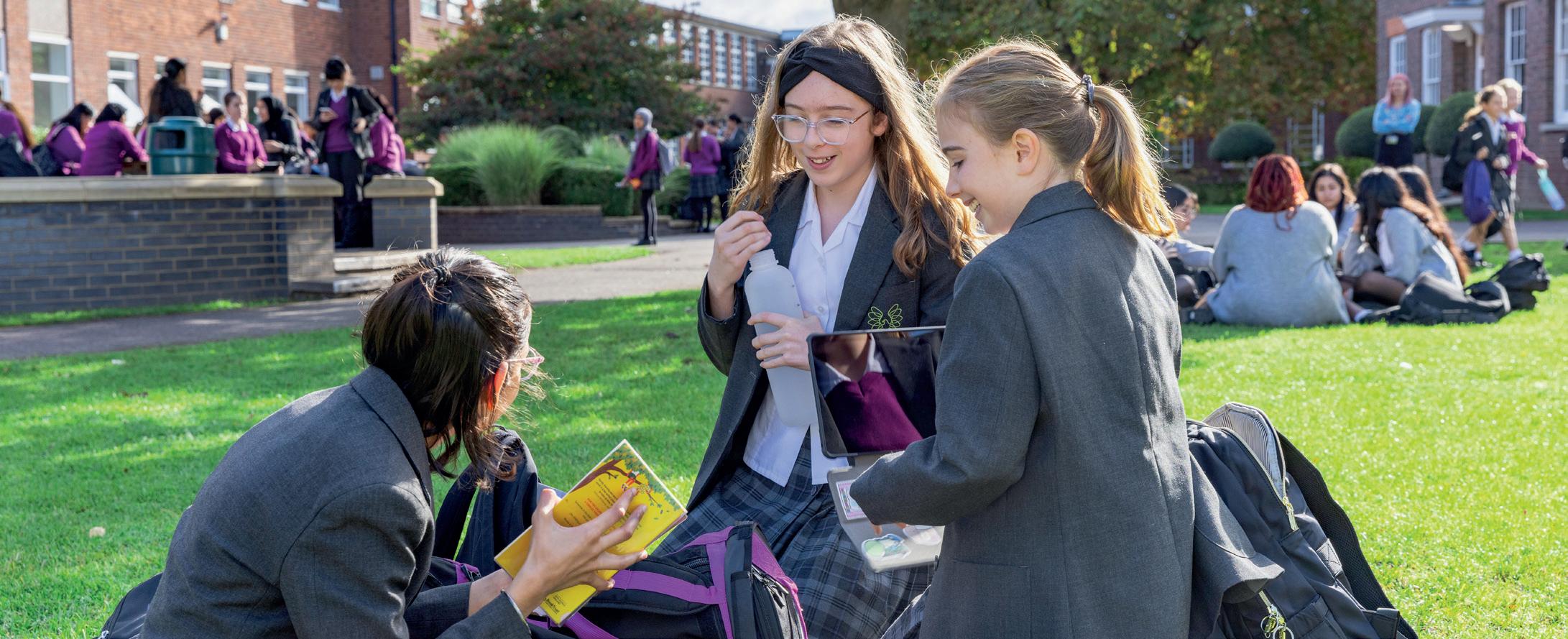
The happiness and well-being of our students is at the centre of our educational ethos; we are experts in helping girls navigate the complexity of growing up. We are committed to investing in resources that will help students develop self-regulation, empathy and resilience.
The Muse sat down with the Deputy Head - Student Engagement and Welfare, Mr Matt Gracie and Head of Year 5, Mrs Kristie Whomsley to explore our new pastoral initiative, Girls on Board
Mr Gracie started by stressing that friendship issues are a normal part of growing up. “BGS is an incredibly happy environment. I witness our students laughing, collaborating, playing, having fun and supporting each other all day every day, but we need to recognise that friendship changes are a normal part of emotional growth. We need to find ways of minimising the impact and setting our students on the pathway for being able to establish strong emotional relationships. This is a key life skill.”
Girls on Board is an approach to dealing with friendship turbulence. It is designed to help develop students’ empathy and awareness of the complexities this entails and provides the adults around them with a non-judgemental set of tools to support the students as they navigate friendships.
Developed by renowned educator, Andrew Hampton, it is specifically aimed at helping girls manage friendships. Andrew drew upon his experience as a headteacher and parent in formulating the approach. It is rooted in psychological research and has been successfully implemented in a range of single-sex settings.
Mr Gracie explained: “As a school we have an extensive set of existing pastoral programmes in place to support our students. One of the huge benefits of being single sex is that they are all focused on the support girls need. However, we must not be complacent; since the pandemic, we have seen that girls are sometimes struggling with friendship issues, and we felt there was a need to strengthen our resources in helping the students understand and manage friendships before problems escalate.
Girls view friendships very differently to boys. A friendship between girls has much more emotional intensity; they often define themselves through their friendships in a way that boys do not. It can be hard as parents to recognise and understand the feelings that a daughter has invested in a friendship. We saw a need for an approach that would work across the whole school - for students, staff and parents where we put girls back in control.”
Mr Gracie added: “I believe Girls on Board makes a difference. Firstly, what is described as ‘the existential imperative’ that ‘every girl needs someone to call a friend’. This phrase resonates with our community. Secondly, ‘when adults get involved things get worse’. This acknowledges that girls want and need our support, but this doesn’t mean intervening or taking over. It means supporting them to make decisions and take actions for themselves. To build resilience and self-regulation young people must take agency and action; if they do not put the strategies into action they will continue to make friendship mistakes. They need trusted adults around them to listen and support them, but not to step in too quickly. At this point I feel it is also really important to stress that this programme focuses on friendship issues, we will never tolerate bullying or bad behaviour; that is always dealt with robustly.”
Mrs Whomsley agreed and added: “The programme recognises how important friendships are for girls and the impact changes to friendships can have on their happiness. The approach empowers them. It uses language they can understand to resolve their own issues as well as giving example scenarios that we can use to help them understand why they need to support their peers when others might be experiencing issues outside of their immediate friendship group. It offers a toolbox of strategies to build empathy and understanding which they can use.”
Mr Gracie went on to explain that change cannot be achieved overnight, and it will take time for the programme to become embedded in the culture of BGS.
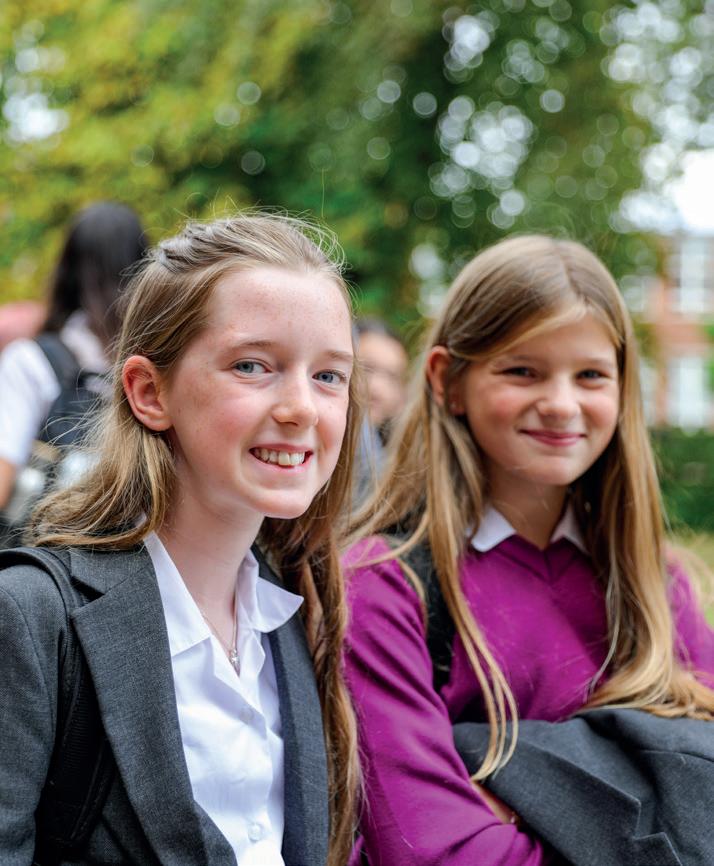
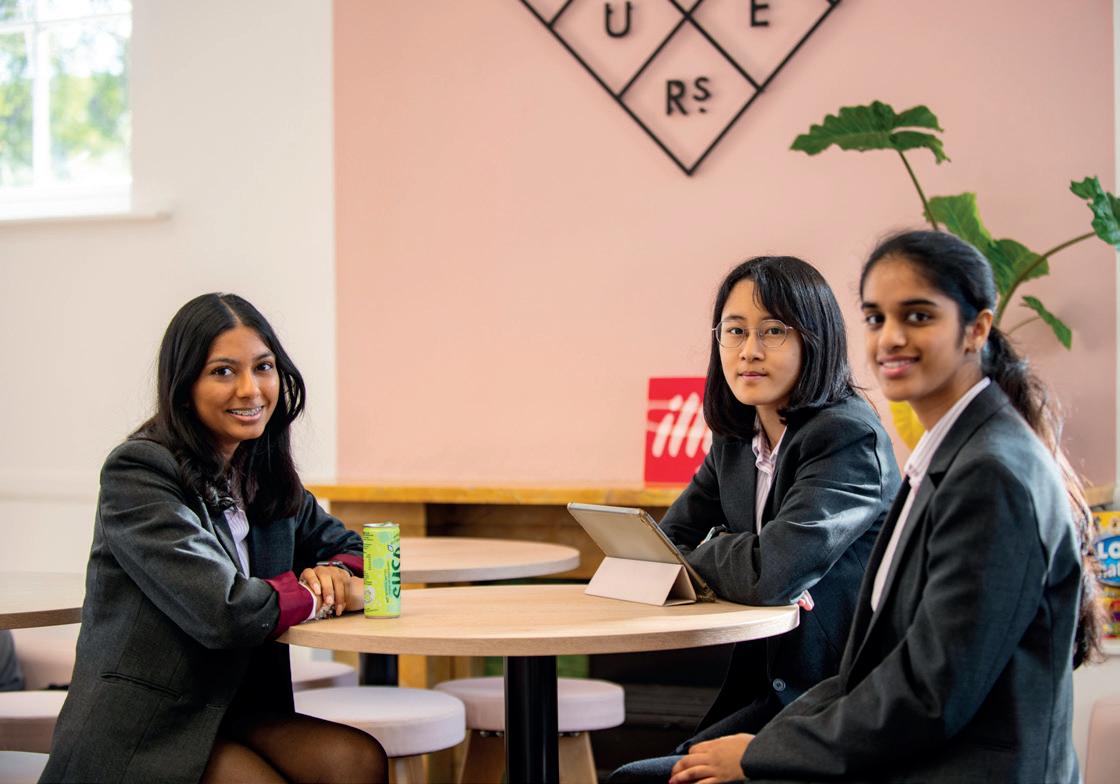
“All staff have attended Girls on Board training, so everyone in the school understands the principles. Our pastoral team have had additional training, so they know how to deliver the programmes in the classroom. We have rolled out the introductory session developed by the Girls on Board organisation. We have learned along the way and adjusted these lessons to match the needs and experiences of our students. We will continue to teach this session every year to everyone as a reminder that we are a Girls on Board school and that we all understand the complexity of friendships. This also means that new students will be familiar with the programme and the strategies right from the start. We have also started to use Girls on Board techniques to intervene when there are friendship fallouts to help students restore balance and trust in one another.”
Mrs Whomsley added: “Girls on Board in the Junior School sets the foundations for friendships throughout the school. By embedding the language and approach in the younger years, it sets the girls up for greater empathy towards each other and more positive relationships ongoing. The aim is by the time they reach the Senior School, they will be ‘experts’ in this approach. It is a logical way of looking at friendships with practical advice to support positive friendships throughout and beyond their time at school then into adulthood. It is beneficial that we start this work from day one and it is a great advantage of being an all-through school.”
In practice when there is friendship turbulence, staff will explore this with girls in an open and non-judgemental manner where they have shared language to bring understanding. In most cases this results in a student feeling heard, validated and quickly knowing what she needs to do next. Girls on Board acknowledges that when girls fall out, the impact can be widespread, so sometimes there is a need for group intervention to enact wider understanding and empathy to help everyone move forward.
Mr Gracie said: “We expect to see a greater feeling for our students that they can resolve relationship issues for themselves and can identify factors in turbulence and how to solve concerns. This is very much an
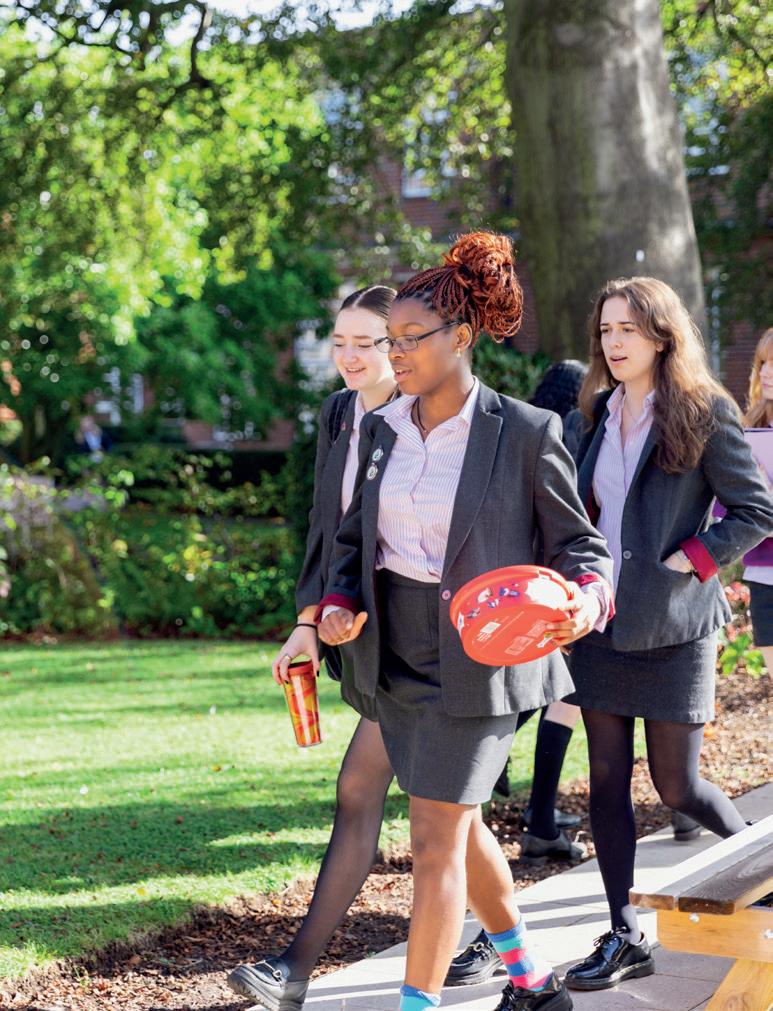
additional tool and something that has been helpful for upskilling us all in the community with shared understanding. It does not replace any other pastoral approaches, it is a supplementary tool for managing something we know can be difficult and painful for our students, as it is in every school.”
Mrs Whomsley reflected on the positive outcomes that she has already started to witness in her classroom: “I have been amazed at how it has helped the girls to use their own voice to resolve minor issues and to prevent them from escalating quickly. It has reduced the need for me to use teaching-time to resolve issues or investigate issues that I have little hope of establishing the ‘truths’ and, most likely, I will have made the situation worse by trying to investigate them. The most positive benefit is the sense of empathy it creates between the girls towards each other and how it helps them to reflect on their own and others’ actions. Girls on Board has made such a positive impact in such a short time.”
Mr Gracie and Mrs Whomsley were keen to stress that the programme will work best with the support from parents, they added: “The main way that parents can support their daughters is adopting the approaches suggested in the parent book when girls fall out, which reminds us that a majority of the time girls just want someone to listen and acknowledge how painful friendship fallouts are. They often don’t want anything done. We will continue to run regular training sessions for parents and listen to their feedback and views on the approach. Parents can best support the programme by letting the girls use the Girls on Board interventions. It is important for everyone to recognise that this can sometimes take a few days to bed down, trusting the school and their daughters is key.”
Mr Gracie concluded: “Bedford Girls’ School is a joyful environment, but every school has friendship issues, it is part of growing up. It is vitally important that we prioritise our students’ welfare and provide the best support possible.”
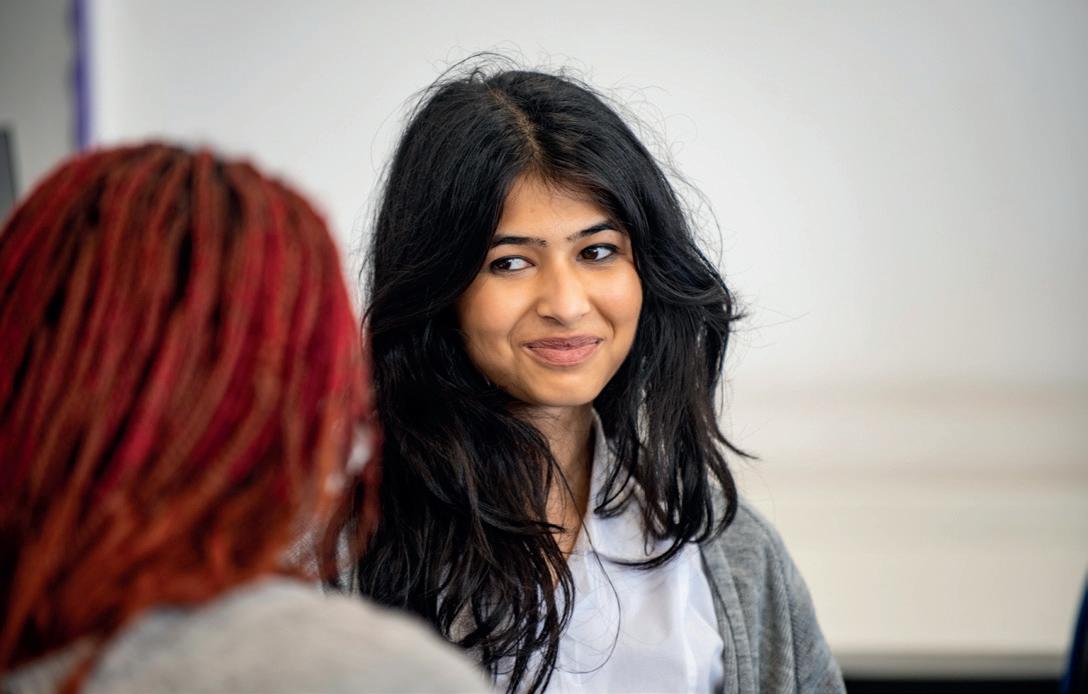
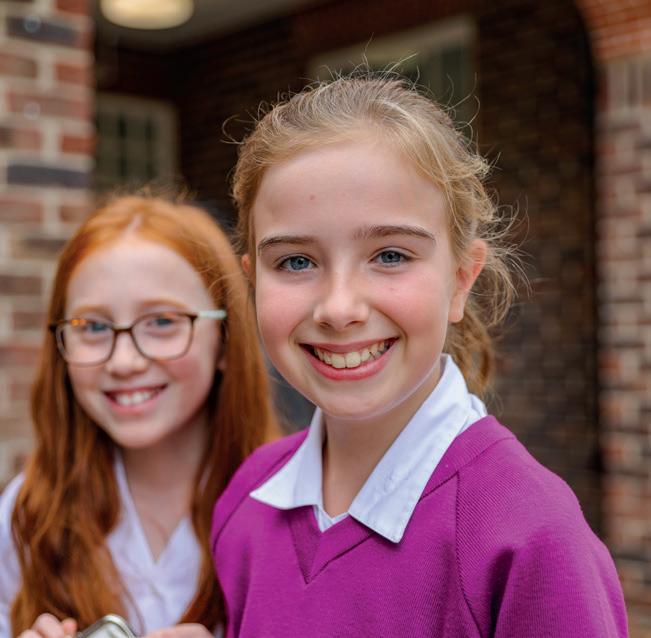
50
of
2,835
Fundraising £14,094.31 raised this academic year for our school charities, FACES and United World Schools (UWS)
Number of productions/events = 7
Number of hours rehearsed = 621
Number of production photos taken = 1,634
Total audience numbers = 1,347
Number of students involved (cast and crew and band) = 461 students
Total number of lighting cues = 615
LAMDA = 172 entries (148 distinctions. 23 merits, 1 pass)
Bedfordshire Festival of Music, Speech and Drama = 172 entries (51% placed e.g. 1st, 2nd or 3rd)
Number of Trips = 9
Total number of students on trips = 602
13 residentials 11 of which were overseas:
Years 10-Upper Sixth USA Hockey & Lacrosse
Tour – East Coast – Washington DC, Delaware, Philadelphia, New York, Boston - July 2024
Year 9 Great War Battlefields Tour – Ypres, Belgium 2024
Years 10-Upper Sixth DT Expo Paris, France - Feb 2024
Years 9-Upper Sixth Trip to Nice - Feb 2024
Year 8 French Trip St Omer - June 2024
Y11-13 Valencia, Spain Trip - Oct 2023
Years 7-Upper Sixth Swimming Camp, Lanzarote - Oct 2023
Years 10-Upper Sixth Berlin, Germany
Residential - Oct 2023
Years 8-9 Cologne, Germany Christmas Markets - Dec 2023
Years 8-Upper
Sixth Austria Ski Trip - Feb 2024
Sixth Form Physics trip to CERN, Switzerland 2024
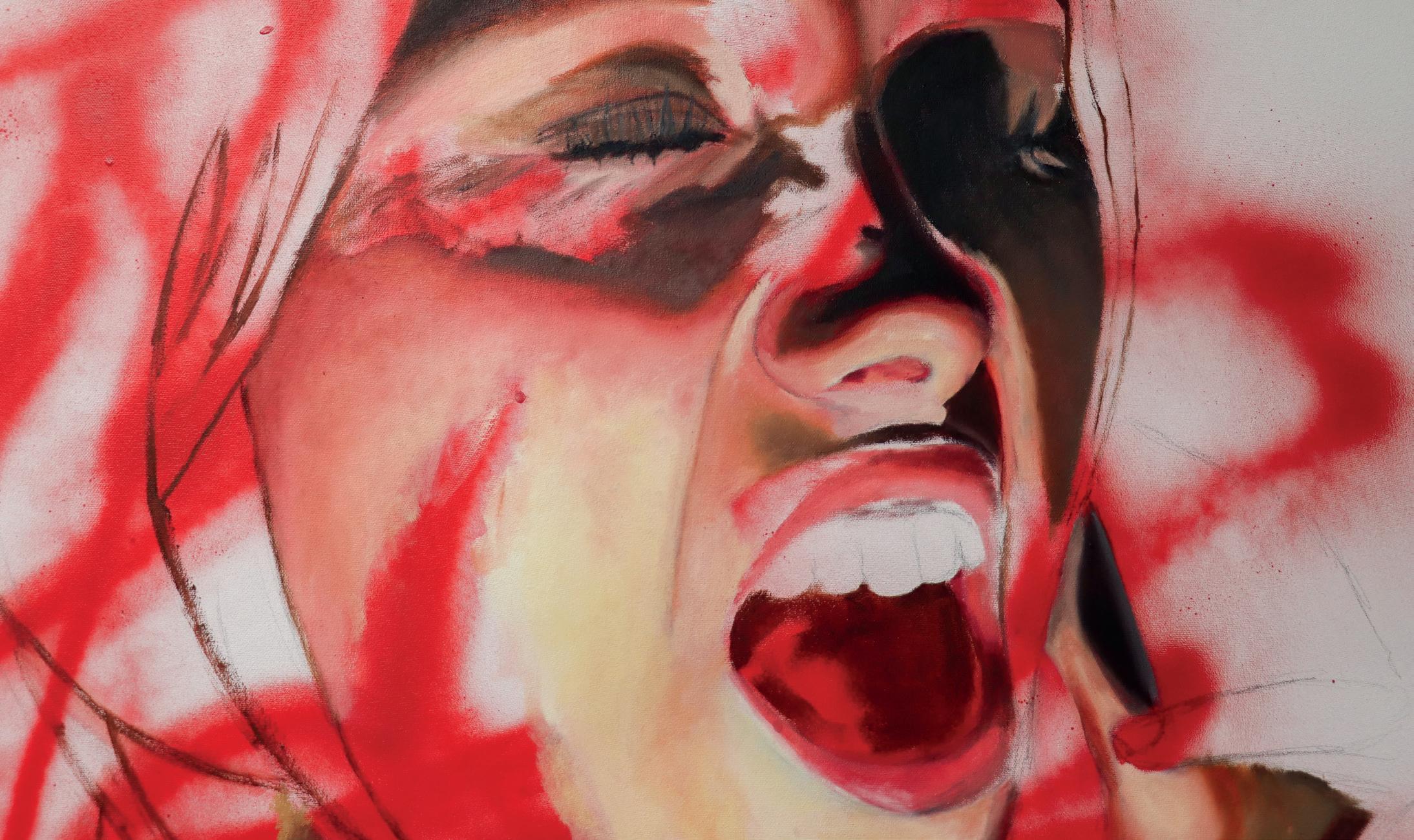
The Summer Show hosted by the Schools’ Art and Textiles Department is a much-anticipated event, where students’ creativity and hard work take centre stage. It provides a valuable opportunity to showcase their talent and artistic achievements to the wider community.
Mrs Chris Lugsden, Head of Art and Textiles, elaborated on the significance of this event:
“The Summer Show is always a highlight; a time when we can pause and reflect on the past year and take some time to share with the wider community our students’ talent, creativity and hard work, and to celebrate their artistic achievements. There is always a vast range of work on display to intrigue and inspire visitors, and this year was no exception.”
Work created by Textiles Design students was presented across the light and spacious newly renovated design studios, where pieces were highly innovative and skilful, coming together in a truly captivating show.
Mrs Lugsden reflected: “Students’ creative use of materials, techniques and processes was clearly evident throughout the exhibition, within their innovative and inspiring supporting preparatory work and their final pieces. On show we had the broadest range of Textiles, from delicate machine embroidery on sheer fabrics to bold bright maximalist
prints, cast resin to super structures built from cocktail sticks; this diversity goes some way to demonstrate the innovative and highly personal journeys our students have been encouraged to go on.
Through exploring the themes Overgrown and Connections, GCSE students were able to investigate a wide range of techniques, including felt making, screen printing, machine embroidery and weaving, to develop ideas leading to highly creative book work and outcomes. Students developed stunning final pieces, including fitted garments, textiles body pieces and sculptural textiles. Externally set assignments were undertaken with skill and interest, where themes such as Creatures were chosen, enabling fascinating lines of enquiry for the final project, with students exploring visual qualities such as the intricate detail of insect wings, producing beautiful machine embroidered butterflies, hand sculpted wire dragonflies and delicate organza flounces. The A Level work demonstrated the clear progression of understanding, and work drew on students’ wealth of skill and
knowledge to develop and refine their creative outcomes. Innovative handling of media was seen throughout the exhibition, with many students developing fitted garments, showcasing excellent pattern cutting and creative design skills to produce eye-catching final outcomes.”
This vast range of themes and approaches reflected the individual pathways our students had taken; at both GCSE and A Level the students had identified a personal approach to their work that exploited their strengths, which made our showcase so exciting this year.
Mrs Lugsden explained: “Our Fine Art students demonstrated a vast range of skills within the show; work was a testament to the students’ ability to blend technical skill with imaginative expression; ranging from drawing, printing and painting to ceramics, casting and installation. Students were unafraid of working with new techniques, and the range of highly personal book work demonstrated the creative journeys all
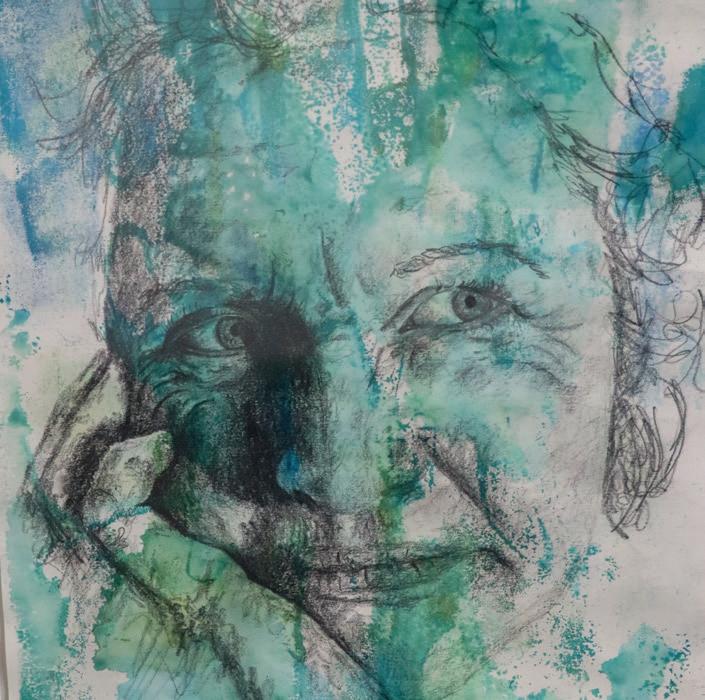
students had been on. GCSE students were grounded in the formal elements within a Still Life project, which resulted in innovative final pieces, inspired by artists such as Nicholson and Heron. The more personal research, exploring the theme of Simple and/ or Complex, allowed students to take ideas in their own direction, with portraiture, architectural forms and the natural environment being popular areas of enquiry. Final externally set assignments, reflecting on the theme of Power, were varied and clearly built on the skills students had developed; it was amazing to see the progression of each and every student over the course.”
She added: “Students working at A Level presented research exploring a broad range of
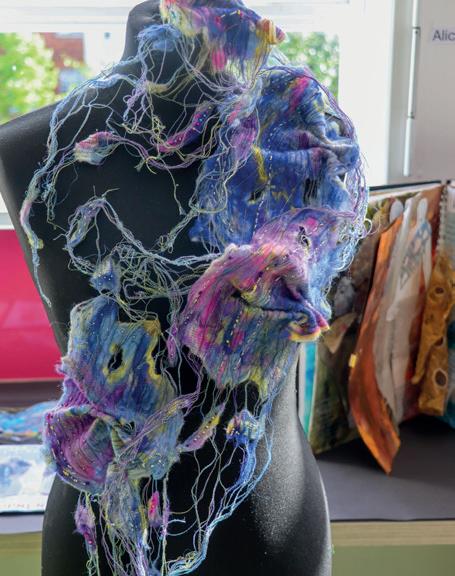
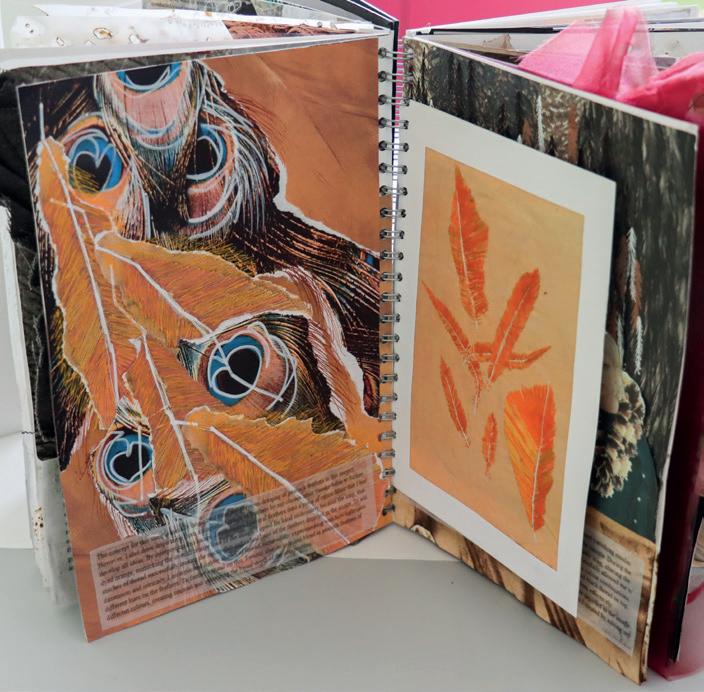
themes, including abstract seascapes, unusual viewpoints within portraiture and etching and lino prints inspired by natural forms. The clear grounding of skills and approaches was evident within the show, and it was thrilling to see the more independent work develop within the sketchbook research; it clearly reflected the culmination of students’ learning and creative development. Interesting personal themes such as family, identity and society were reflected upon by students within their externally set assignments, and a wide range of approaches and materials were handled with skill and ingenuity. The diversity of themes, techniques and materials showcased in this exhibition was truly impressive, illustrating the breadth of the curriculum and the students’ willingness

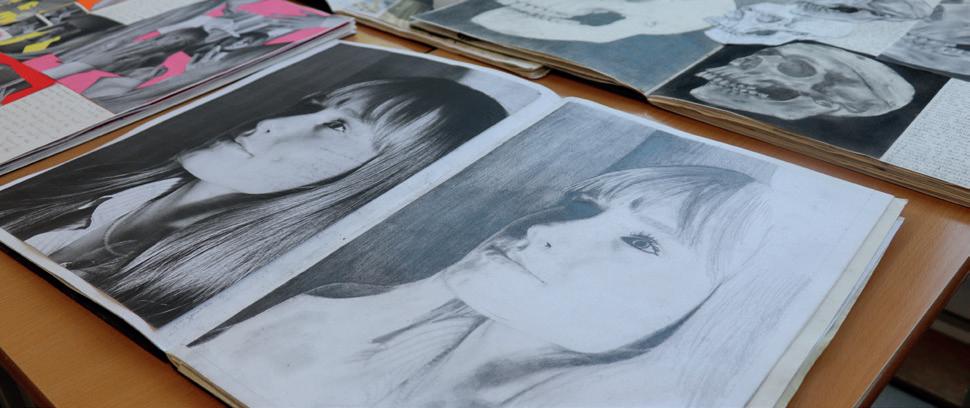
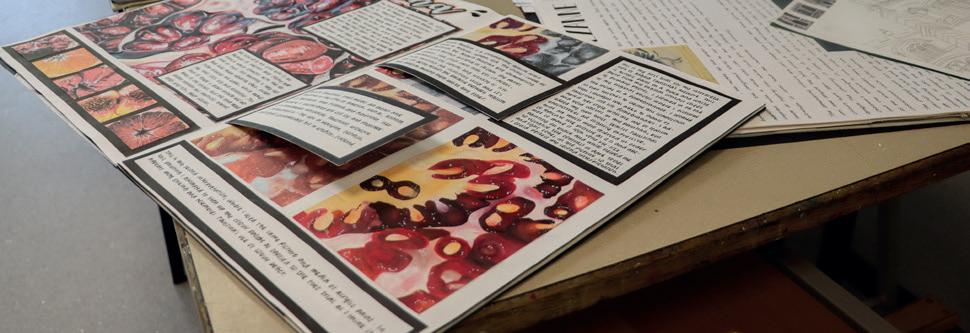
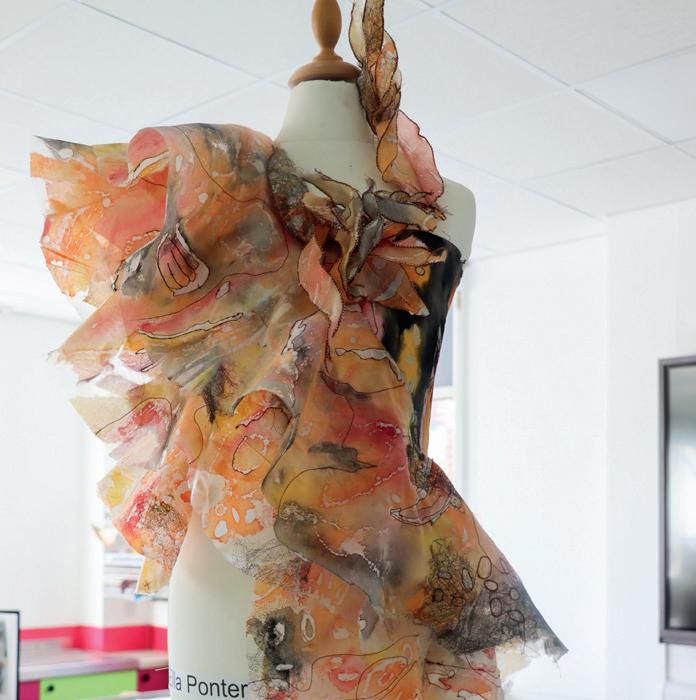
to explore and experiment, and the creative passion of teachers in their support of these creative journeys.”
Mrs Lugsden concluded: “The exhibition was not only a celebration of individual achievement but also a reflection of the supportive and nurturing environment fostered by our dedicated Art and Textiles specialists; the collaboration between students and teachers was evident throughout. The Summer Show of Fine Art and Textiles Design was yet again a resounding success, showcasing the extraordinary talents of our students and the exceptional guidance of their teachers. It was an excellent event that left visitors inspired by our school’s outstanding artistic community.”
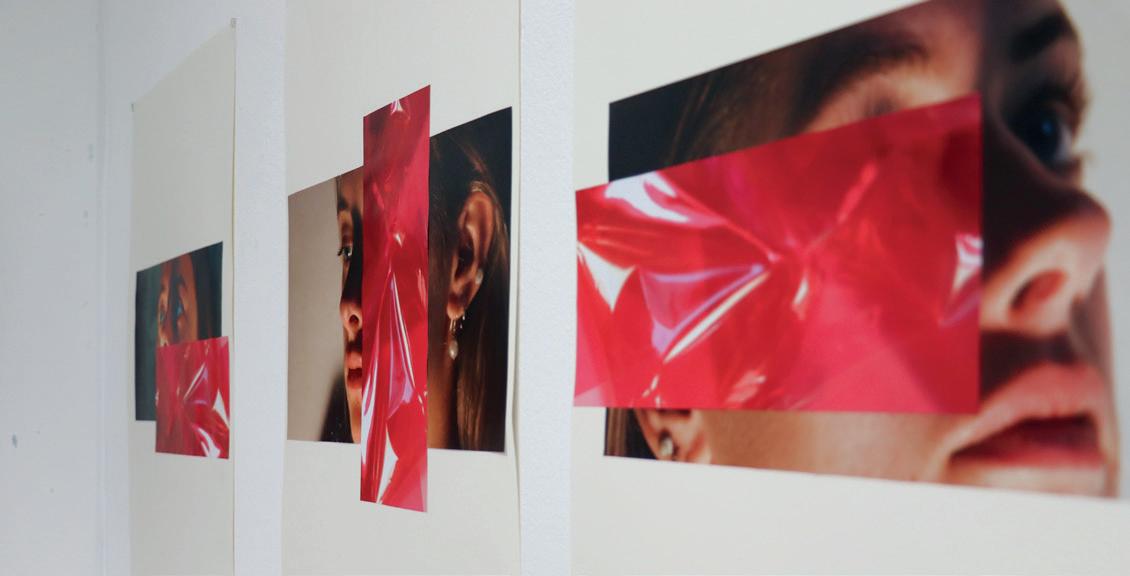
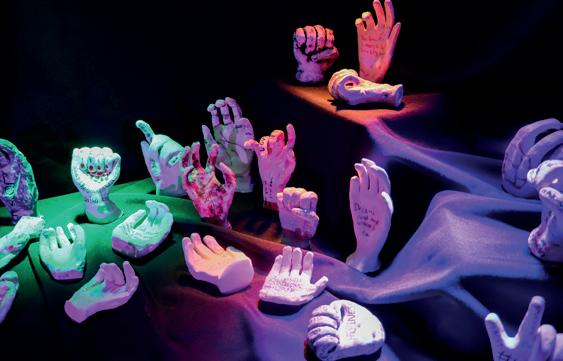
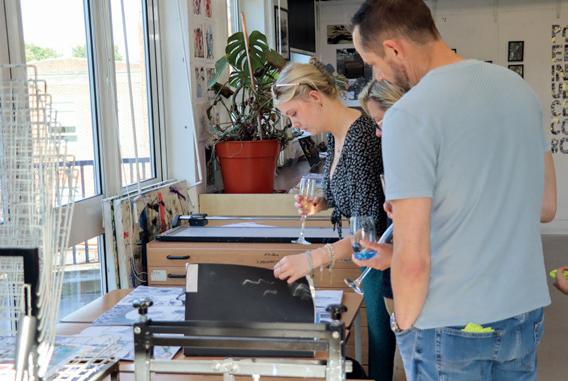
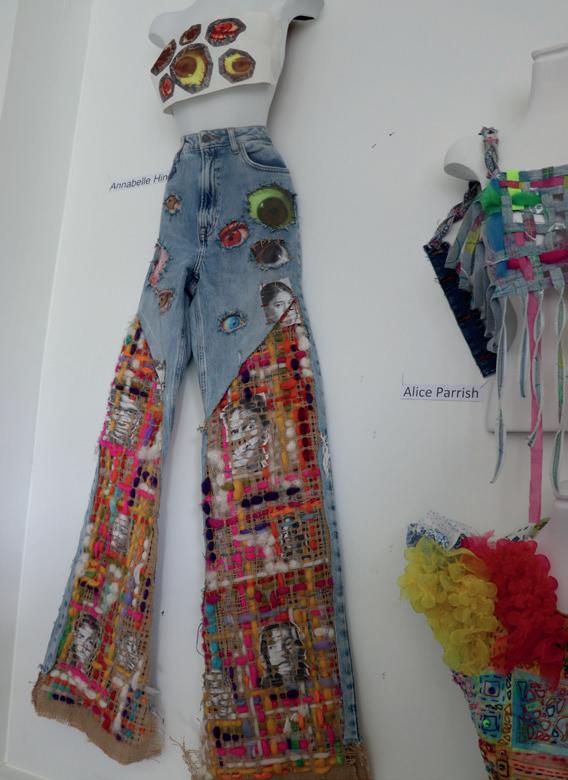
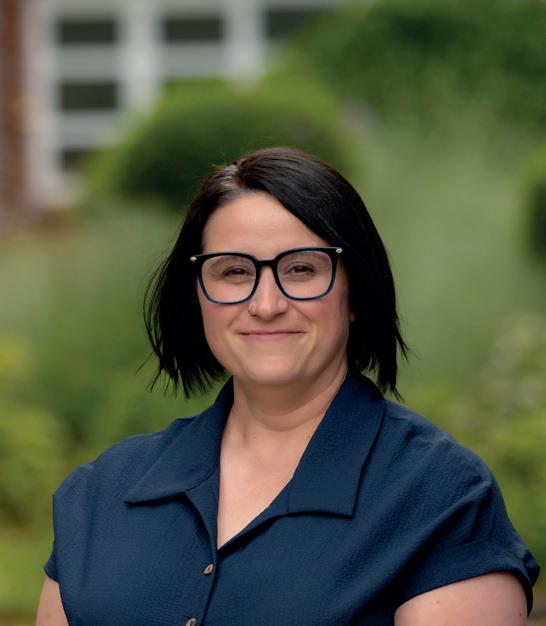
The last week of this Summer Term marked two years at BGS for me, and as I continue my work of horizon scanning, I can honestly say it is an exciting time for sustainability. As the exponential growth of technology seems to know no limits now, the combination of the digital with Green Thinking or Clean Tech is producing some very exciting possibilities.
At BGS, we are committed to providing an exceptional education that prepares our students for the future while also nurturing a sense of responsibility towards our planet. We want to explore and implement green technology within our educational environment, striking a balance between innovation and respect for the unique character of our school.
Green Technology, or Clean Tech, refers to environmentally friendly innovations that help conserve energy, reduce waste and minimise carbon footprint. By incorporating these technologies into our school, we aim to not only reduce our environmental impact but also provide valuable learning opportunities for our students.
The benefits of adopting green technology in education are manifold. Firstly, it allows us to lead by example, showing our students the importance of environmental stewardship. Secondly, it can result in significant cost savings over time, allowing us to redirect funds towards other educational initiatives. Lastly, it prepares our students for a future where sustainability will be at the forefront of many careers and industries.
We are considering several green initiatives, such as water conservation with rainwater harvesting systems for watering our school grounds, significantly reducing our water consumption without altering the structure of our historic buildings. We are also exploring the use of smart water metres to monitor usage and detect leaks in real-time. In terms of waste reduction and
recycling, we are planning the implementation of a comprehensive recycling programme and exploring composting options for our food waste, which will not only reduce our landfill contribution but also provide practical lessons in resource management. Introducing talking smart bins will help teach students about proper waste segregation!
Additionally, we are investigating electric vehicle charging points to encourage staff and parents to switch to eco-friendly vehicles, helping to reduce our community’s carbon footprint. Respecting the aesthetic of our listed buildings, we have already led the way and installed energy-efficient LED lighting in appropriate areas to reduce electricity consumption. We are currently looking into smart lighting systems that adjust brightness based on natural light levels and occupancy, although this will be cost-dependent.
While our listed building status may limit some options, we can still capture the ethos of innovative green technology through creative implementations and educational simulations that will provide interesting learning opportunities for our students. For instance, we are currently investigating how we can create a virtual simulation of a school-wide solar power system to teach the concept of virtual power plants. Students could monitor real-time energy data from actual solar installations around the world, comparing it to our school’s energy use.
There are several opportunities for projects where students study nature-inspired solutions to environmental challenges, such as designing hypothetical improvements to our school building based on principles found in nature. We could implement a small-scale IoT (Internet of Things) system to monitor our resource usage, where smart plugs track energy consumption of devices in a selected lab to provide insightful data, which could be used in maths and science classes, making resource management tangible for students.
Using Augmented Reality (AR) apps on iPads, we can create virtual overlays showing the ‘hidden’ green features of our school or visualise the environmental impact of our daily activities through exploring Virtual Reality (VR) environments that are impossible to visit in the real world. We can also explore the concept of blockchain by creating a simple system to track and reward students’ eco-friendly actions, like a virtual GreenCoin that students earn for sustainable behaviours.
We believe that the transition to a more sustainable school should involve our entire community. We will be organising workshops and events to educate and engage students, parents, staff and alumnae in our green initiatives. We are also keen to work with members of our community to learn from their ideas and experience as to how we can make our school more environmentally friendly.
As we undertake this green journey, we are excited about the possibilities it holds for our school. By embracing sustainable technologies, we are not just reducing our environmental impact; we are equipping our students with the knowledge and skills they’ll need to thrive in a sustainable future. Together, we are not just adapting to the future – we’re actively shaping it.”

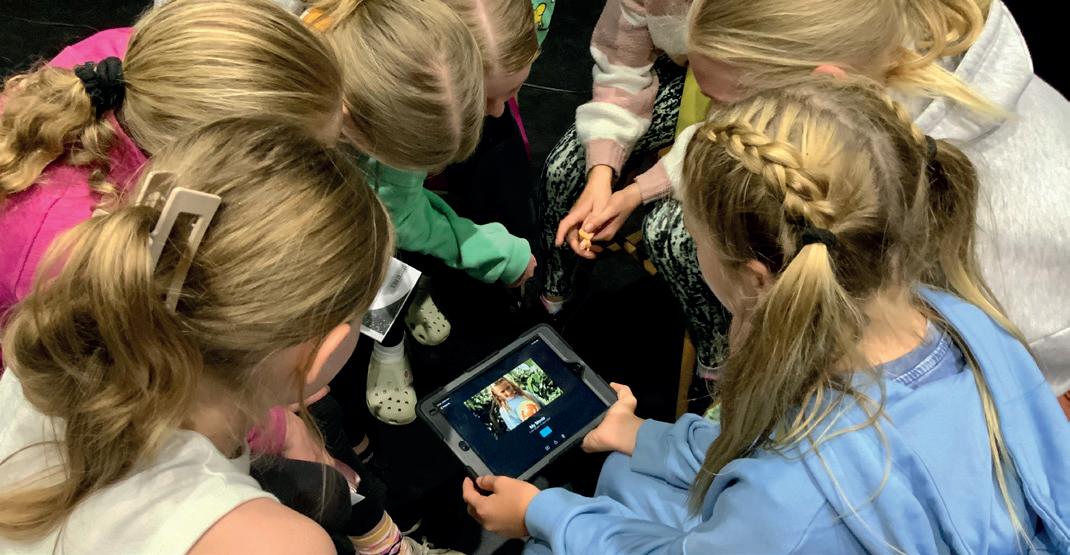
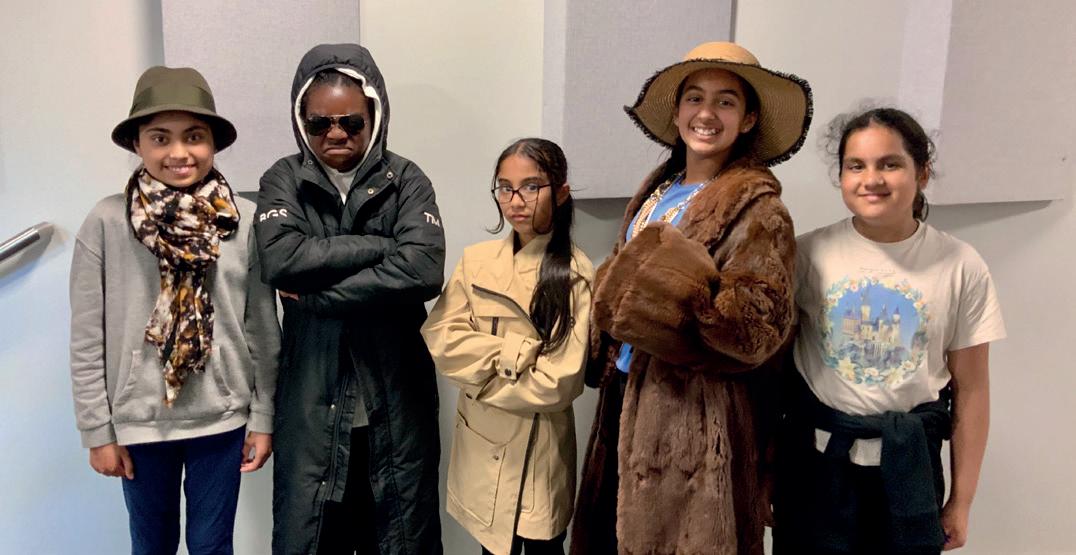
Year 6 pupils were given the opportunity to showcase their burgeoning blockbuster filmmaking talents with One Day Film School. The day was packed with engaging activities, expert-led workshops and culminated in an exciting awards ceremony.
To get the day started, our Year 6 cohort were introduced to a wealth of knowledge in the morning with explorations into different aspects of filmmaking processes from the study of film history; where students embarked on a journey through the evolution of cinema, from its early days to the latest advancements in special effects, to a workshop in fight choreography; where they got to analyse classic fight scenes, the students learned the intricacies of staging and filming fight sequences. Students even experimented with filming their own roundhouse punches, bringing action to their burgeoning portfolios. Finally, before being let loose with their creative ideas, students studied camera techniques and received professional tips and tricks on how to handle a camera as well as a screenwriting session which focused on the three crucial elements of a good script and the art of creating memorable characters.
After an eventful morning, Year 6 were full of enthusiasm, Abhinaya Sivakumar said: “The drama workshop was a great opportunity to explore the different filming techniques and now, whenever I watch a film, I think a bit deeper about how the film was made in addition to what it is about.”
Lia Ben Cohen added: “I enjoyed learning how to film the different shots that are used to film movies and learning how to punch someone in a movie!”
With their new skills to hand, the budding filmmakers were ready to take on the 10 Shot Challenge. Working in groups they had to create two-minute-long silent films, accompanied by music. The challenge was to construct a compelling narrative within the constraints of a classic theme, such as “someone is kidnapped, an attempted rescue.”
During the afternoon the school was awash with film crews, creatives and actors putting their talent and knowledge into practice before the big reveal to families and friends at the film screening later in the day where each film was shown, showcasing the exceptional hard work and creativity.
To finish off a wonderful experience, prizes were awarded to teams for Best Motion Picture: celebrating the overall best film; Best Performance; acknowledging outstanding acting; and Best Technical Achievement, which honoured excellence in technical aspects such as cinematography and editing. As the students clapped and cheered the winning films, they all agreed it had been an incredible opportunity.
Naya Prabhu said: “I aspire to be an actress and I think this experience had helped me improve on my acting skills. I now look at movies and TV shows differently, as I can see the difference in the camera angles and how actors ‘fake fight’ in the fighting scenes! Overall, the workshop was one of my favourite moments at BGS.”
Gabi Cranfield commented: “The film day was so much fun, whether it was acting, fighting or editing. It was really exciting getting to work with people who actually have made a profession out of it, especially when they taught us. The skills I have developed the most were communicating with my group about our ideas, being open-minded about other people’s ideas and finally being a risk taker for getting the best shots.”
The One Day Film School was a remarkable experience for Year 6, providing them with a comprehensive day of learning, collaboration, creativity, and celebration; inspiring the students to continue exploring their creative passions. As the students look back on their achievements, the BGS community can be proud of the talent and enthusiasm displayed by these young filmmakers. We eagerly anticipate the next wave of creative projects from these budding directors, screenwriters, and actors.
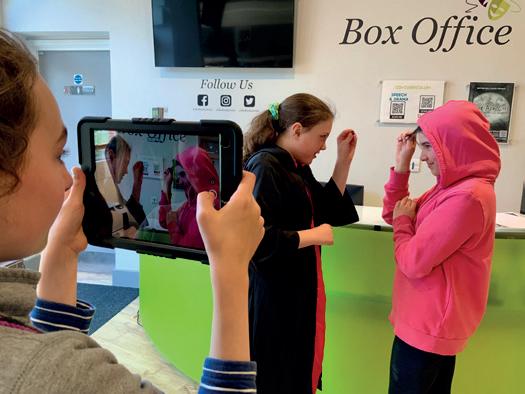
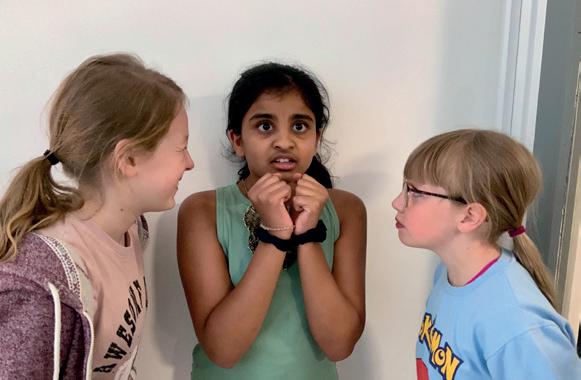
According to the Youth Sports Trust report in 2022, nationally only 45% of girls meet physical activity recommendations and vast numbers drop out of sport by secondary school age. National School Sports Week, running in mid-June, is a national initiative which emphasises the importance of physical activity and encourages school children to participate in sport. As a school which places a great priority on the importance of sport and fitness, we significantly buck these trends, but we are always keen to explore new avenues to promote sports, and sport role models to our students, to help maintain engagement and motivation.
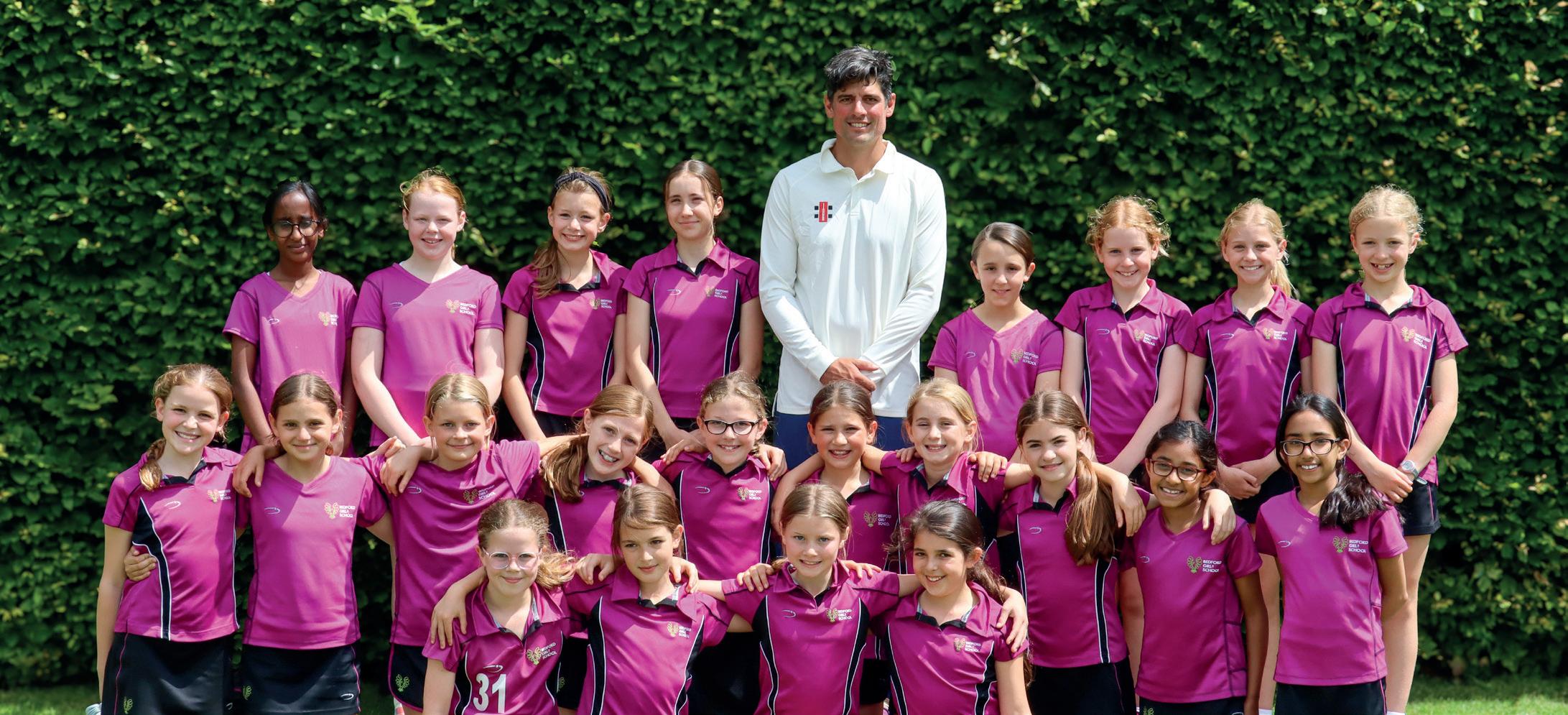
Using this initiative as a theme in school, we took the opportunity to highlight some diverse sporting careers and achievements to enthuse our students. Through engaging activities and interactions with accomplished athletes and those working in the sports industry, including some members of the BGS community, the aim was to encourage our students to pursue their own sporting passions and consider potential careers in the sports industry.
Director of Sport, Mrs Verity Mason-McLeod explained: “We are a top UK sports school but more importantly sport plays a crucial role in the holistic development of our students, fostering not only physical health but also resilience, teamwork and leadership skills. Research shows us that access to role models and learning from other experiences is key to motivating young people to continue their involvement in sports. By introducing them to accomplished athletes and sports professionals, our
students gain invaluable perspectives on the dedication and perseverance required to succeed in sports and beyond. Female role models in sport are particularly significant, as they inspire our students to pursue their passions and break barriers in traditionally male-dominated fields. The stories shared during National School Sports Week highlighted the diverse paths and achievements of sports people, reinforcing the message that our students can achieve excellence in any arena they choose.
At BGS, we are extremely fortunate to have connections to a great diversity of individuals involved in different aspects of the sporting arena. It was wonderfully exciting to have a week dedicated to these stories being shared.”
Mrs Mason-McLeod continued: “I was particularly inspired by the talk by the original Lionesses—Jan Emms, Chris Lockwood, Leah Caleb, and Gill Sayell. These pioneering women captivated our Years 7 and 8 audience

with their incredible journey to the 1971 Women’s World Cup in Mexico. Their stories, from playing on uneven park pitches to performing before over 100,000 spectators at the Azteca Stadium, were truly inspirational. Our students were in awe and listened intensely. Many had been totally unaware of this exceptional achievement and left keen to watch the full tale of Copa 1971 – The Lost Lionesses. Their visit underscored the significance of perseverance and resilience, showcasing how dedication can lead to groundbreaking achievements and breaking barriers for women in sports.”
We were delighted to host Anna Allerton (née Edwards, DAHS 2000), a former SKY Sports journalist. Anna shared her fascinating career trajectory from writing to on-camera reporting and the creation of her magazinestyle show, Sportswomen, which shines a light on various women in sport. Her journey highlighted the diverse career opportunities within the sports industry and emphasised the importance of representation and storytelling in inspiring future generations.
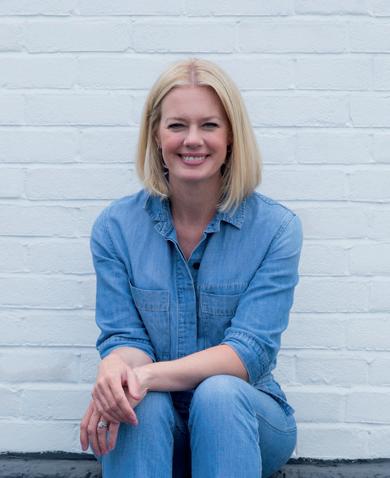
Mrs Mason-McLeod added: “Anna’s talk gave students an insight into a career path that until relatively recently was dominated by male journalists. It helped our students see that there are routes to using their academic skills within the sports world to build a successful career while still focusing on their passions.”
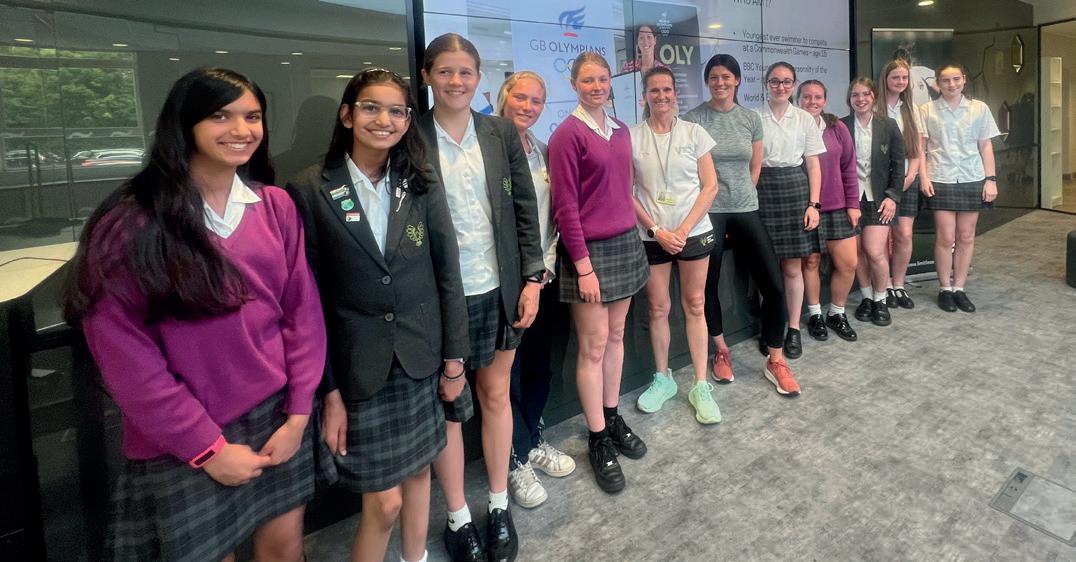
On Tuesday 18th June, Kate Haywood, a former Team GB Swimming Olympian and motivational speaker, joined us. The BBC Young Sports Personality of the Year 2003 winner recounted her inspiring story of resilience and mental fortitude. She detailed her journey through rigorous training, overcoming serious injury, and her eventual participation in the 2012 London Olympics. Kate’s experience reinforced the importance of mental strength and determination, serving as a powerful example of how to overcome challenges both in sport and in life.
Mrs Mason-McLeod said: “It is important for any aspiring sportswomen to hear about how it does not always go according to plan and to understand the depth of resilience needed to recover from injury in order to make it back onto the national stage. It often sounds straightforward but the reality is greatly different; it is an outstandingly difficult achievement. Kate was able to explain this through her own inspirational experiences and it was a real honour to listen to her story.”

Our Years 5 and 6 cricketers were very excited to have the opportunity to have a cricket masterclass from Sir Alastair Cook CBE, former England Cricket Captain. Alastair led an engaging session in bowling, batting and fielding, providing practical tips and demonstrations. The session concluded with a Q&A, where our students eagerly sought his insights, further enriching their understanding of the game and its demands. This was particularly timely as the Year 6 cricket team were competing at IAPS the following day.
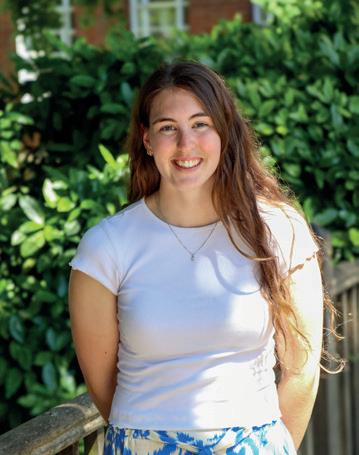
The week concluded with a lunchtime talk from alumna Bronwyn Tagg (2019). Bronwyn, a competitive swimmer and triathlete during her school years, shared how she balanced her intensive training with her academic commitments. She spoke about her journey after school, pursuing a Sports Business Management degree at Leeds Beckett University, and her current role as a Marketing Officer for England & Great Britain Hockey. She also emphasised the importance of embracing new opportunities, such as how she made the move into playing rugby. Bronwyn’s career path illustrated how skills developed through sport can be effectively translated into professional success.
Mrs Mason-McLeod reflected on the success of this initiative: “National School Sports Week was an overwhelmingly positive experience for our students. The diverse range of guests and activities provided valuable insights into the world of sports, showcasing various career opportunities within the industry.
“The presence of these role models underscores the importance of providing our students with opportunities to engage in sports at all levels. Whether through competitive play, coaching, or pursuing careers in the sector, the experiences and lessons gained from sport are crucial in nurturing confident, capable young women who are ready to make their mark on the world.”
Ifirst became aware of Michael Morpurgo’s work as a boy at the Perse Prep School in Cambridge. I already had a love of animals and Africa; my brother having recently moved to live and work out in Zimbabwe helped this fascination. I vividly remember scouring the Prep library for something, anything out of the ordinary. As a strong reader, I knew I could become obsessive; having just devoured the entire range of Enid Blyton’s Famous Five novels, but I’d never truly had my head turned by a book quite like The Butterfly Lion. It was provocative, powerful and profoundly sad and yet I loved it. The more I think about this story, the more I’m overwhelmed with the amount of depth and layers Morpurgo was able to graft into what is originally aimed as a children’s book. My first reading at age 7 triggered my imagination into life in Africa and the bond that humans can have with animals. My second effort, a few years later, shone a light on the terrors of war and the tribulations of long-distance love. Reading the book now as an adult has illuminated the importance of connection, with both humans and animals, in our fleeting time together.
Upon researching the man behind these ideas and skills, I found a rather interesting character. A man who found writing hard. A man who professes not to have enjoyed reading whilst growing up, and even now struggles to maintain concentration throughout a novel. But he wrote what he knew. He used a lovely balance of personal reflection and of what had interested him. He went to boarding school and hated it, bar the rugby and music. He loved animals and had a fascination with Africa. He lived through difficult times at war and even enrolled as a British soldier, although this was short-lived. He is wonderfully humble and sought advice and expertise whenever he could find it. He became a teacher. He is charitable and practises what he preaches creating a charity for inner city children to experience country life and animals that continues today.
On a recent podcast with Sir Michael Rosen, he shone a light on how, as a Year 6 primary school teacher (many years ago, he admits), he was appalled at the quality of literature taught in schools and how in English lessons, his
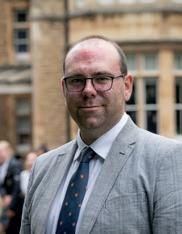
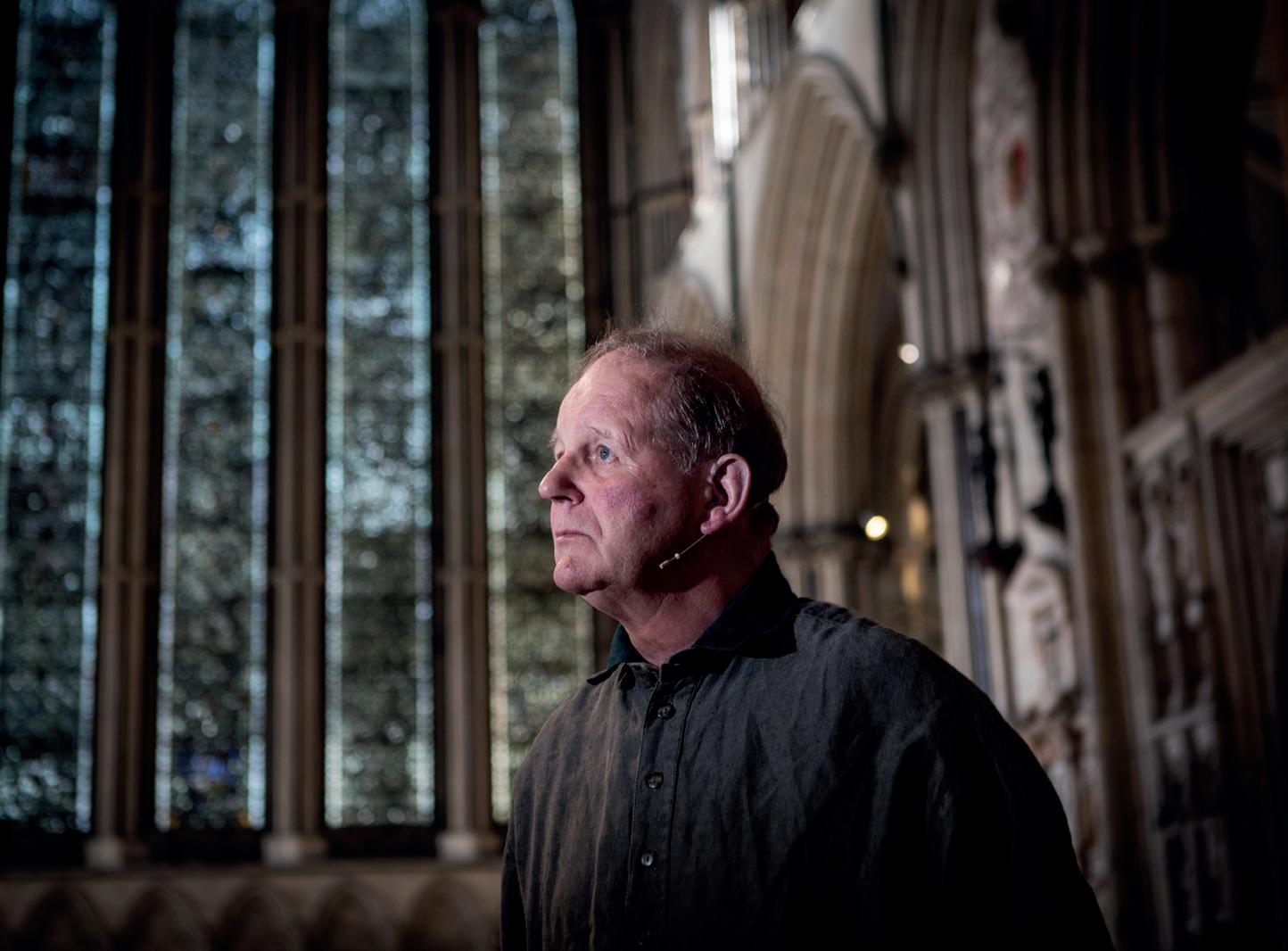
pupils would simply “switch off.” The process, in his eyes, was counterintuitive to sparking imagination. Skill focused, but without the engagement of imagination is a flame with a dwindling ember. In one anecdotal tale, Morpurgo states that after reading a particularly dull story to his class, noticing the severe lack of engagement, he came home to discuss the possible reasons with his wife. “Well, how did you read it to them?” she said. So, the next day, he came into school, determined to whip up some excitement about the tale, putting on voices, acting out scenes and yet he still noticed children dreaming and gazing out of the window, not being able to remember anything of what was read to them. He came home to his wife and showed her exactly how he’d read it today and was met with silence. Finally, she spoke and told him that it was either him or the book that were the problem and suggested that he do something about it and write his own. Rather successful, he was, too.
What I take most from Michael Morpurgo is his humility, humour and warmth. Now, at 80 years old, he himself can sit back and reflect on his life and his achievements (although he wouldn’t gloat or pat himself on the back). It makes me think of my own life and when I reach the dizzy
heights of 80, I want to be able to look back and have some good stories to tell. To have lived through tricky times and come out smiling. To know that I’ve made a difference to those who really matter, young people. To show warmth at every opportunity and to understand that life is short and about developing connections. Proudly, Morpurgo wrote what he knew; he knew his limitations and how to be successful within them. He continues to spark imagination in young people today, not just relying on his classics, but using his grandchildren to give him ideas and insight in the more complex, modern world of children.
At just two weeks old, 2lbs in weight in a plastic incubator, Olive Powell had read her first book. It was The Butterfly Lion